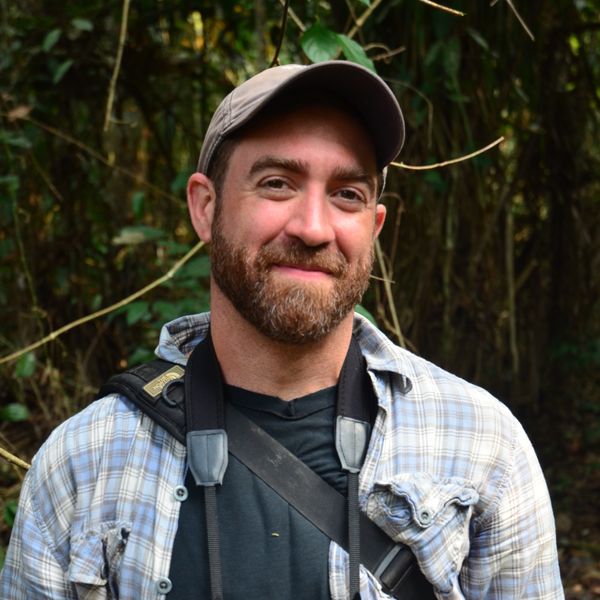
Associate Professor
he/him or they/them
Affiliations
Department of Biology, Women’s, Gender & Sexuality Studies Program
Website
https://www.evopropinquitous.net
Areas of Expertise
Mechanistic and adaptive aspects of developmental variation in primates; genetics and genomics; behavioral ecology; physiology; morphometrics
View Professor Schmitt’s CV – 2024
About
Christopher Schmitt is Co-PI of the Sensory Morphology and Anthropological Genomics Lab at BU. His research focuses on primate development and life history as they relate to energetics and metabolic disorders, and incorporate techniques from genetics/genomics, behavioral ecology, and morphology across the Order Primates and in vervet monkeys (Chlorocebus spp.) and ateline primates, in particular.
Through intensive fieldwork across Africa and the Caribbean with the International Vervet Research Consortium, Dr. Schmitt has collected biological samples from over two thousand wild vervet monkeys. Current projects in his lab using this dataset include characterizing evolutionary patterns in the developmental morphometrics and physiology of various vervet populations, including the use of population and comparative genomic techniques. Dr. Schmitt also investigates the genomics of metabolic function and disorders during development in over 700 fully sequenced and pedigreed captive vervets at Wake Forest University. Work in his lab is ongoing to assess the phenotypic impact captive-identified obesity-related genes in his extensive wild sample, assessing variability in phenotype expression and population-specific selection based on local ecology and anthropogenic impacts. Field work for these projects is ongoing (UROP students are welcome to apply), and can be followed on social media at #BUvervets.
Dr. Schmitt’s interest in metabolic function also extends to high altitude adaptation and conservation genomics in ateline primates, particularly the Critically Endangered Peruvian yellow-tailed woolly monkey (Lagothrix flavicauda). Students in Dr. Schmitt’s lab are currently conducting the first population genomic assessment of the yellow-tailed woolly monkey using portable genomics technologies, and are in the process of developing a de novo reference genome for the species in collaboration with the Wildlife Conservation Lab at Los Amigos Biological Station (genomics in the jungle!) and Peruvian conservation NGO Yunkawasi Perú. Dr. Schmitt and his students also conduct more traditional conservation-oriented fieldwork with yellow-tailed woolly monkeys, including population surveys in collaboration with NGO Neotropical Primate Conservation, and behavioral ecology work with La Asociación de Conservación Oso Dorado in the protected area Hierba Buena Allpayacu.
Selected Publications
- Gagnon CM, Svardal H, Jasinska AJ, Cramer JD, Freimer NB, Grobler JP, Turner TR, Schmitt CA. 2022. Evidence of selection in UCP1 gene region suggests local adaptation to irradiance rather than cold temperatures in savanna monkeys (Chlorocebus spp.). Proceedings of the Royal Society B, 289:20221254.
- McHugh SM, Cornejo FM, McKibben J, Zarate M, Tello C, Jiménez CF, Schmitt CA. 2020. First detection of the Peruvian yellow-tailed woolly monkey (Lagothrix flavicauda) in the Región Junín, Peru. Oryx, 54(6): 814-818.
- Schmitt CA, Service S, Cantor RM, Jasinska AJ, Jorgensen MJ, Kaplan JR, and Freimer NB. 2018. High heritability of obesity and obesogenic growth are both highly heritable and modified by diet in a nonhuman primate model, the African green monkey (Chlorocebus aethiops sabaeus). International Journal of Obesity 42: 765-774.
- Turner TR, Schmitt CA, Cramer JD, Lorenz J, Grobler JP, Jolly CJ, and Freimer NB. 2018. Morphological variation in the genus Chlorocebus: Ecogeographic and anthropogenically mediated variation in body mass, postcranial morphology, and growth. American Journal of Physical Anthropology 166: 682-707
- Savanna Monkeys: The Genus Chlorocebus. 2019. Editors: Turner TR, Schmitt CA, Cramer JD. Cambridge University Press.
Courses
- CAS AN 102 Human Biology, Behavior, and Evolution
- CAS WS 101 Gender and Sexuality: An Interdisciplinary Introduction
- CAS AN/WS 233 The Evolutionary Biology of Human Variation
- CAS AN/BI 333/733 Human Population Genetics
- CAS AN/BI 336/736 Primate Behavioral Ecology
- CAS AN 551 Human Evolutionary Genomics
- CAS AN/WS 558 Human Sex Differences
- CAS AN/BI 588 Project Design and Statistics for Biological Anthropology